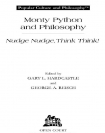Monty Python and Philosophy, Gary Hardcastle [portable ebook reader TXT] 📗

- Author: Gary Hardcastle
Book online «Monty Python and Philosophy, Gary Hardcastle [portable ebook reader TXT] 📗». Author Gary Hardcastle
The Pythons scrambled lots of things—people and situations. Maybe we must simply be humored into enjoying this. Ludwig Wittgenstein (1889-1951) once remarked that those who seemed to have solved the riddle of life seldom had anything to say regarding what the riddle was. But Wittgenstein did not say that these liberated and “enlightened” ones didn’t laugh. Maybe that is exactly what they did. I’d like to suggest that their laughter was the very solution to that riddle of life they had pursued.
This may come as a bit of a shock. But the fact that the meaning of life is not what it seems does not mean that, for the Pythons, there is no meaning to life. Nor, on the other hand, is there any indication in the Pythons that there is something we might call “the meaning of life.”
I’d suggest that the Pythons help us to glide through the seriousness of theological atheism, past the mortuary of existential despair, to what some might call eliminative “comedyism.” There is no such word, but since we do need it, we’ll just go ahead and use it.
Eliminative materialism is the view from which my analogy is drawn. And it is fairly well known. It simply—well, of course, nothing in the philosophy industry is simple—involves replacing words in your vocabulary that commit you to mind-body dualism, René Descartes’s (1596-1650) old problem, with words that do not. If you are thorough and complete in your switchings and really get the hang of these replacement words, the mind-body problem bothers you much, much less. If you come to forget the words these replacement words replace, you probably can no longer figure out what the mind-body problem actually is, except through some pretty serious scholarship. And you’re going to need a philosophical dictionary.
Eliminative comedyism is much the same, except it is found less in replacement vocabularies than in altered reactions and responses. Is a major dimension of the “real” journey of life from piety to laughter? Thinking about it, neither too long nor “deeply,” what in fact could be meaningless about this? As the Pythons might suggest, such a conception is worth a chuckle or two. And such chuckles might serve as unexpectedly helpful hints regarding life after the meaning of life.
Aspects of Pythonic Philosophy
“No score, but there’s certainly no lack of excitement here . . . ”
10
God Forgive Us
STEPHEN FAISON
In Monty Python and the Holy Grail, King Arthur (Graham Chapman) and his Knights of the Round Table get into all sorts of comic trouble as they search for the sacred article. Why do they seek it? They have been commanded by God. According to the animated God, people have lost the sense of purpose to their lives. Arthur is to search for the Holy Grail and in doing so provide much needed inspiration to others.
On the first leg of their journey Arthur and his knights reach a castle. Arthur announces himself to the guards as “King of the Britons,” and invites their master to join his holy mission. Unfortunately the spokesman for the castle guards (John Cleese) is not British. Even worse, he’s French! The Frenchmen snicker at Arthur’s invitation, and when the King threatens to enter by force in the name of God, they hurl nonsensical insults, then livestock. King Arthur is frustrated because his God, wearing a kingly crown, really did order the quest, and Arthur expects others to be moved by his holy authority. The reaction of Cleese and his mates illustrates how silly the mission seems to those who do not share Arthur’s beliefs. In order to accept Arthur’s claim, they must believe that God would command such a mission and enlist English “pig-dogs” to accomplish it. The Frenchmen are skeptical, to say the least.
Scenes pertaining to religious belief in Monty Python and the Holy Grail, Monty Python’s Life of Brian, and Monty Python’s The Meaning of Life raise the issue of God’s character, his behavior, and the role he plays in our lives. The need to speculate about God’s relationship with us almost seems unnecessary given the existence of the Holy Bible. The Bible not only contains alleged first-hand accounts of God, but actually features appearances by God Himself. The Christian theory of God establishes the deity through its story of the creation and its aftermath. According to the Christian narrative, a supernatural deity called God, “with powers and abilities far beyond those of mortal men,”55 created the heavens and the earth and human beings and other less important stuff. These human beings were given dominion over all living creatures. Humans were also given immortal souls and free will to choose good or evil. Of course, we screwed it up. Adam and Eve disobeyed orders, and they and their descendants were punished with mortality and condemned to toil the earth.56 Sometime later God issued a pardon in the form of His son, Jesus Christ, who would take the rap for human disobedience. Human beings could now receive salvation and eternal life in heaven, provided they repent their sins, ask God for mercy, acknowledge Jesus as the savior and live a life of submission to God. Even then they cannot be certain of admission to heaven, but can only hope to be judged worthy.
The Christian account reveals a God who is in all ways perfect, yet displays some suspiciously human characteristics such as jealousy and anger. This presentation seems strange until we consider the possibility that man actually created God in his image. This alternative interpretation would explain why God exhibits these unflattering human traits. Nevertheless, certain Church doctrines are based on this truculent side of the Christian God,





Comments (0)